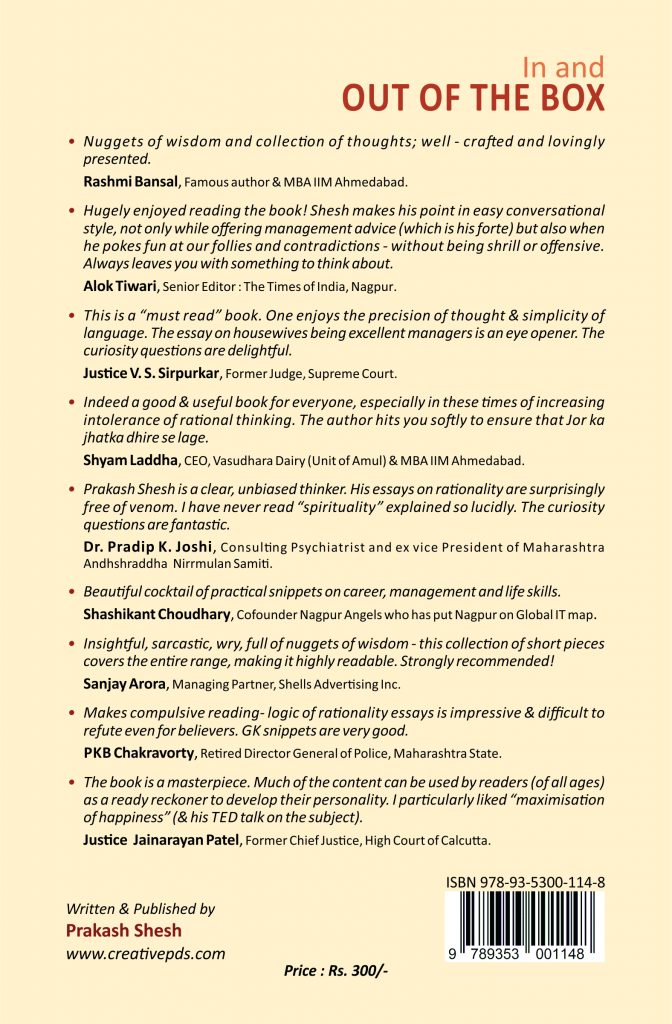Authored by Prakash Shesh, PGP ‘74
Reviewed by Shashi K. Sharma, PGP 1973 and Subhash Bhave PGP 1966
 Having opinions on major issues and developing an ability to defend these without hurting others is a vital parameter of one’s personality that invariably leads to a high rate of success in whatever you undertake. Ability to think rationally and aspiring to be intellectually independent is another trait of people who go far in life. Innovative thinking is also an ability that can be developed by nurturing your child like curiosity. This book “In & Out of the Box” will assist you to develop all these. It is a compilation (62 essays) that covers a wide range of topics with the help of short nuggets of wisdom that force you to look inwards. It brings forth the beauty of simple management truths that may permanently change the way you think. The book holds a mirror in front of the reader and softly pokes fun at her follies and contradictions but without ever being shrill or offensive. The ideas are precise and the thoughts have been written in easy conversational style.
Having opinions on major issues and developing an ability to defend these without hurting others is a vital parameter of one’s personality that invariably leads to a high rate of success in whatever you undertake. Ability to think rationally and aspiring to be intellectually independent is another trait of people who go far in life. Innovative thinking is also an ability that can be developed by nurturing your child like curiosity. This book “In & Out of the Box” will assist you to develop all these. It is a compilation (62 essays) that covers a wide range of topics with the help of short nuggets of wisdom that force you to look inwards. It brings forth the beauty of simple management truths that may permanently change the way you think. The book holds a mirror in front of the reader and softly pokes fun at her follies and contradictions but without ever being shrill or offensive. The ideas are precise and the thoughts have been written in easy conversational style.
Reviewed by Shashi K. Sharma, PGP 1973
When one is reviewing a book written by someone known, the task becomes relatively easier – one knows the context of the ideas that are flowing and the underlying influences. Prakash is a very logical and eclectic thinker. Being an avowed atheist, he has had to stand his ground through a sharp and incisive intellect. All these qualities are reflected in his book which covers a vast variety of topics with equal erudition – be it Management (particularly Marketing), Communications, Human Relations, Life Skills and even Philosophy of Life…
A relevant question in the case of any writing is whether it is of publishable quality. In the case of this book this question is already answered as it is a collection of articles which Prakash wrote and published in various national newspapers like “Times of India”, “Economic Times” and also in Central India’s very reputed newspaper “THE HITVADA”.
The articles provide wisdom in chewable bites. Prakash has carried over the quiz culture from IIMA. Many of the articles present the subject matter in say 10 points. And then the reader is encouraged to grade himself / herself in relation to those 10 points with Prakash’s own assessment of how many points mean what. The quiz culture is also reflected in numerous general knowledge questions interspersed throughout the book with respective answers given at different pages – making it compulsory for the reader to turn pages, and maybe serendipitously find some new nuggets of knowledge.
Can some things be improved? Of course. Nothing in the world is perfect. I have suggested to Prakash to include some humour a la Scott Adams or C. Northcote Parkinson, in the next edition of his book. Dear reader, the implementation of my suggestion is in your hands. If you briskly buy the book in bushels then very soon we should be able to see a new and improved edition of “IN AND OUT OF THE BOX”!!!
Reviewed by Subhash Bhave PGP 1966
The book is an excellent exposition of the thoughts of the author on topics of interest to all of us. In the preface, the author in his modesty has stated that he is not a gifted author. After reading the book we find that this statement in not correct. The section which helps us “Look inwards” and the one on “Simple management Truths”, have proved otherwise.
Brevity, as the author himself has rightly pointed out, is of great essence. The book scores very high on this point. In the essay “Learn to recognize others strengths”; only one sentence brings out the complete practical philosophy – “The most difficult part is always developing this ability to recognize strengths in others” – very nicely said in a short sentence. All the essays have this quality.
Clarity of thinking is another aspect which makes this collection of essays very interesting. This quality can be observed in all the essays. When the author says that “inflexibility is the cause of unhappiness”, he has very clearly but briefly stated his thought. The section – ‘Simple Management Truths’ has brought in all the important management principles (about which we are all fond of) very clearly. The chapter on “Marketing strategies in recession” is a classic example of this clarity.
Most of the essays have been written and published in leading newspapers over a period of more than ten years. They are still very relevant. It will be appropriate to say that they are representative views of his generation. The ‘Curiosity Questions’ given in between the book add to the value of the book. The author needs to be congratulated for bringing out such a nice collection of essays.


